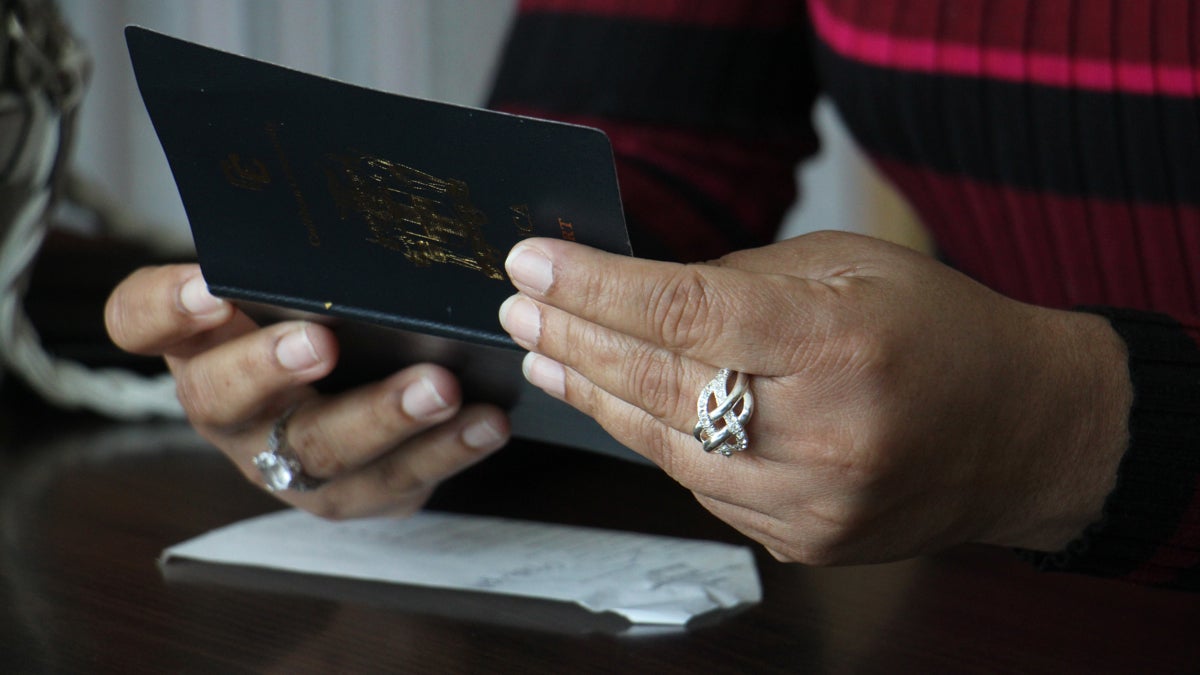Tanesha: An unauthorized worker abused by her employer
Listen 4:04
Tanesha holds her Jamaican passport. (Emma Lee/WHYY)
“Life, unauthorized” is a series from WHYY that looks at the personal immigration stories of individuals who are living in the Philadelphia region without legal status.
—
Tanesha, 40, from Kingston, Jamaica
Tanesha had wanted to come to the United States for a decade to escape Jamaica’s troubled economy and to find work. She had applied for visas twice since 1997 and was denied. But when her marriage soured and her husband became abusive, she tried again and was approved.
She had friends in Philadelphia, so in July 2015, she moved to the U.S. on a visa that allowed her to stay for six months. But, she says, she missed the deadline to extend her visa after bad advice from an employer and has remained here, unauthorized, since then.
She sends money back to Jamaica to support her four children, ages 24, 22, 9, and 4, who still live with relatives there. She hasn’t seen them in almost two years. Though unemployment is improving in Jamaica, it still sits at 13 percent.
Life here has had its challenges, too. She said she used to work at a restaurant in Olney run by Trinidadians, but she quit after a year because they underpaid and overworked her.
In her own words: How employers take advantage of unauthorized workers
“I was working like over 12 hours a day for $300 a week, and that’s like six days per week: cooking, serving, cashing, cleaning, everything. I felt real used and abused. They told me I have to keep low-key, because they know people. They know people in Immigration, they know police officers, they know lawyers [and they would turn me in if I complained].
“I know I’m not supposed to be working, because I’m illegal here. So because of that, I just walked away. I didn’t report [them]. When people know your situation, especially your [unauthorized] status, they tend to take advantage of you and use you for their benefits.
“People treat immigrants here like criminals and slaves, and that’s just a fact. And some people really treat you like dirt.”
Tanesha now works as a home health care aide in Connecticut — a job she found through a friend — but keeps an apartment in Northeast Philadelphia and sees doctors here for cardiomyopathy, which she was diagnosed with a year ago.
“[As a new immigrant,] you don’t know who to trust, you don’t know where else to go. I live in fear every day. I’m not comfortable, because I keep on looking out if Immigration is going to come and get me or something.
“But at the end of the day, to be quite honest, I am just trying to make an honest living, and doing the right thing here, not getting in any trouble with the law or anything else. I work. I have a tax ID number. I’m just trying to stay on the right path.
“I can understand to a point if you want to get out the immigrants that have bad records, violence, and murderers and stuff. I can understand that. But what about us that are innocent? Why are you aiming at us? We’re just trying to make an innocent living here, an honest living, in helping not just your country, but our country also, and our family.”
WHYY is your source for fact-based, in-depth journalism and information. As a nonprofit organization, we rely on financial support from readers like you. Please give today.


